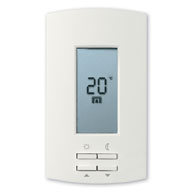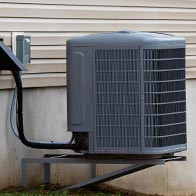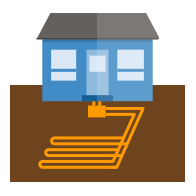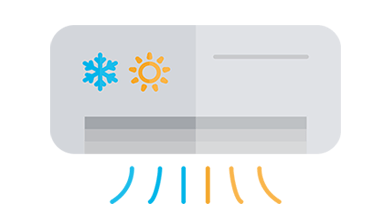Tips on heating
Find out about the various types of heating systems and related products and choose the ones that best suit your needs. And don’t forget to adopt good heating habits to save even more.
Temperature control
Good habits
- Don’t try to warm up your home faster by cranking up the thermostat to a higher temperature than you actually want. It doesn’t work!
- Check your thermostat setting. Turning it down just 1oC (2oF) is enough to save you money.
- Lower the temperature in unoccupied rooms and keep doors closed. This will allow you to reduce your heating expense without sacrificing comfort.
Energy-efficient products

By replacing your conventional thermostats with Smart thermostats, you could save up to 10% on heating costs every year.
- Replace as many conventional thermostats as possible.
- Replace all the thermostats in open areas.
- If you can’t replace them all, start with the rooms where heating is needed most.
- Have the new thermostats installed by a master electrician.
How to choose a thermostat
- Electronic thermostat – Choose an electronic thermostat to match the total wattage of the baseboard heaters it will be controlling.
- Electronic thermostat for fan-coil heaters – Heaters with fans need a special kind of thermostat. The manufacturer’s specifications include all the information you need to make the right choice.
- Programmable electronic thermostat – Choose a programmable model that suits your lifestyle (work schedule, time spent away from home, etc.). Rooms always kept at the same temperature don’t require a programmable thermostat.
- Smart thermostat – New electronic models known as smart and communicating thermostats are now available. They aren’t suitable for all heating systems, so it’s important to read the specifications of the different models before buying.
- Hilo smart home service – Choose from among a number of connected products (thermostats, plugs, switches and more) that are controlled using a mobile app and save up to 15% on your annual electricity bill. During winter peak periods, participate in challenges to reduce your energy use (by agreeing to let Hilo automatically lower your heating) and earn cash rewards—an average of $205 each winter.
Heating systems

Investing in an efficient heat pump: A smart choice!
Purchase and install an eligible efficient heat pump and receive financial assistance under Hydro-Québec’s LogisVert Efficient Homes Program. Combine several measures and you could earn even more.
Why opt for an efficient heat pump?
When the weather is cold, a low-temperature heat pump is efficient and uses less energy than other heating systems, so it takes less electricity to run and saves you money.
A heat pump doesn’t actually produce heat: it extracts and concentrates heat in the outside air and transfers it to the home’s interior. That’s why it uses less energy.

New home? Consider a geothermal system
If you want an eco-friendly solution, a geothermal system can be an excellent choice for heating and cooling a new house or when replacing a heating system at the end of its service life. A geothermal system can save you up to 60% on heating costs (as compared to electric baseboards).
Insulation
Good habits
- Seal any gaps around the sill plate, windows, doors and fireplaces to keep heat in and cold air out. It’s an inexpensive solution that will result in substantial savings.
- Caulk the garage door and check the condition of its weather stripping. You’ll reduce drafts and use less energy to heat your garage.
- If you have a mail slot in your front door, caulk it around the edges, replace the weather stripping and make sure the spring is in good condition. Better still, block it up and install an outside mailbox.
- If there’s a cat flap in one of your doors, caulk it around the edges, replace the weather stripping and make sure the spring is in good condition. Ideally, you should block it up.
- Put up plastic film over your windows to significantly reduce heat loss. It’s simple to do and only takes a few minutes per window, but it really works.
Energy-efficient products
Choose ENERGY STAR® certified windows and patio doors. You could save up to 10% on heating costs every year and make your home more comfortable.
When should you replace them?
If your windows are more than 20 years old, are hard to open, are drafty or leaky, you should think about replacing them with ENERGY STAR® certified models.
They won’t necessarily cost more than conventional windows, but even if they do, your energy savings should help you recoup your investment in a reasonable amount of time.
When buying a new house, it’s well worth your while to opt for energy-efficient products, such as ENERGY STAR® certified windows, because new houses often have many windows and a large living area, which takes a lot of energy to heat.
How to choose windows and patio doorsOther good habits
- Open blinds and curtains during the day and close them in the evening.
- Don’t put furniture in front of heat sources (baseboard heaters, radiators, etc.).
- If you have forced-air heating, keep air intakes and registers clean: the system will work better.
- When you use your fireplace, as soon as the fire has died down, shut the doors and damper (to close the chimney flue) to keep warm air in and cold air out.
- Clean ventilation system filters regularly and replace them as specified by the manufacturer. You’ll optimize the air flow.
- Make sure that the hatch to the roof space is airtight and well insulated. If you can get into your roof space, caulk any gaps around pipe penetration points, light fixtures and other such openings.




